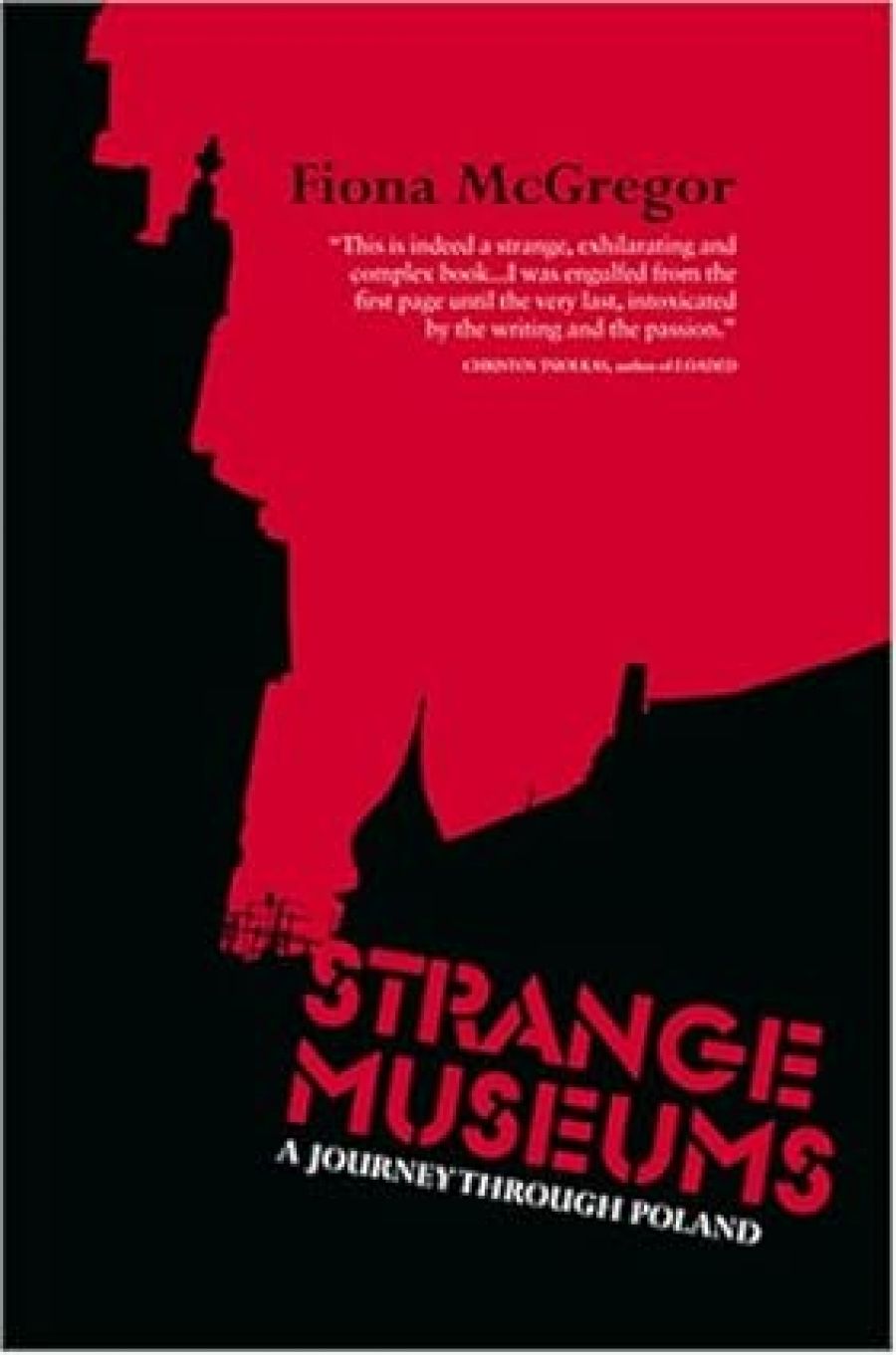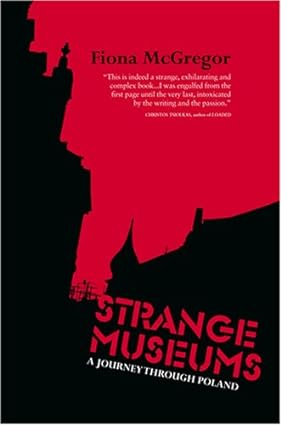
- Free Article: No
- Contents Category: Non-fiction
- Review Article: Yes
- Article Title: Inheritors of darkness
- Online Only: No
- Custom Highlight Text:
Strange Museums is a strange book, a kind of fugue whose first theme is introduced by the poem ‘Tortures’ by Polish poet Wislawa Szymborska. It is a lament of evasion, uncertainty, the reservoir of pain that is the body and the inability to escape. It is enlarged da capo with the author’s discovery of a plaque commemorating the day in 1942 when Jews were rounded up and shot in the town of Piatrk w Trybunalski.
It is the tale of a most unusual journey made through Poland by performance artist and writer Fiona McGregor from May to July 2006. With A A Wojak, her performance partner and former lover, the journey is focused around an international action art festival where the two women, as senVoodoo, perform their confronting work, Arterial. It involves fear and shock, with the pain and risk endured by the artists calculated to take them to the edge. Even in description, Arterial draws a gasp.
- Book 1 Title: Strange Museums
- Book 1 Subtitle: A Journey through Poland
- Book 1 Biblio: UWAP, $24.95 pb, 238 pp
- Book 1 Cover Small (400 x 600):

- Book 1 Cover (800 x 1200):

Bleeding from their wrists, the two white-shrouded figures move almost imperceptibly along a white path to a rhythmic, visceral soundtrack of body sounds. The ten-metre path is photographic paper treated with emulsion to preserve the colour and texture of the dripping, smudging blood. The paper’s furled scroll-ends imply the endlessness of the journey and the endlessness of loss and mourning.
That first encounter with the Holocaust is followed almost immediately by a visit to the town’s Great Synagogue, now a library. A monument rather than a museum, it is still a repository for history. The museums that punctuate the text often relate to the Holocaust. Others such as Lublin’s Singer Museum, the Museum of Books in Lódz and the home of Nobel Laureate Wladislaw Reymont in Piatrków Trybunalski are illuminating in different ways. senVoodoo’s passage through Poland parallels the narrative of war and oppression, and, though performed elsewhere, the context of this book makes Arterial a metaphor for the author’s view of Polish history.
A A’s family is Polish and her history is ‘a typical Polish story’ full of lacunae, contradictions and untruths. Though Australian-born, she spent many years in Poland studying and working. Without her there would be no book. Through her friends and acquaintances and the extraordinary nature of senVoodoo’s tour, McGregor has a deeply moving intellectual experience in a country full of darkness. On her first night, she learns her most enduring lessons about the country. The Jewish question is vexed, Pope John Paul II is sacrosanct and homosexuality is a dangerous thing. The three lessons are contrapuntal themes and the blood-based performance, the spilled blood of World War II, pogroms, plagues, oppression and invasions pulse through the veins of the book.
Arterial is painful, but to consider such self-inflicted pain in connection with Poland’s sufferings is outrageous except to force contemplation on a contemporary and deeply serious interpretation of tragedy. For centuries, any expression of dissidence meant persecution, but the openness of so many Polish venues to a work as difficult and esoteric as Arterial reflects the way the human spirit somehow reasserts itself.
McGregor did not come in search of the Holocaust, but it is inescapable. There is a habit of blaming the Holocaust on the Poles, but three million non-Jewish Poles were killed along with gypsies, psychiatric patients and tens of thousands of homosexuals. Poland’s history wars are a little different from those of Australia.
A new oppression has overtaken the postwar communist régime in the form of the Catholic church. After the euphoria of Gdansk and Lech Walesa, his parish priest Jankowski preaches hateful anti-Semitism. Ignoring the rebukes from some of the clergy, he fuels the Kaczynski government’s heavy-handed family values and rabid anti-homosexual views.
McGregor is the obsessed foreigner, but Polish A A owns the torment. An outsider’s distress is nothing to that of an inheritor of darkness. McGregor’s constant questioning is not merely curiosity but a lifelong habit of confrontation, illustrative she says, of cowardice as well as of bravery, principally her concealment of her sexuality in submitting to the Polish ‘oppressive cloud of Catholic morality’, despite having lapsed and being what she calls a secular Catholic.
The book is not all black. Lyrical descriptions of town and country enchant, with pictures of the poor, delicate, slightly balletic Polish eagle emblem and ‘swallows like tiny eyebrows’ at dusk. McGregor’s style is insistent, instructive, but never pedantic. The map is helpful; an index might have been useful to cross-reference poets, priests, potentates and politicians with unfamiliar Polish names.
‘All we have in Poland is history,’ says a friend. Fiona McGregor relates a singular historic view in this carefully controlled and fascinating book.


Comments powered by CComment